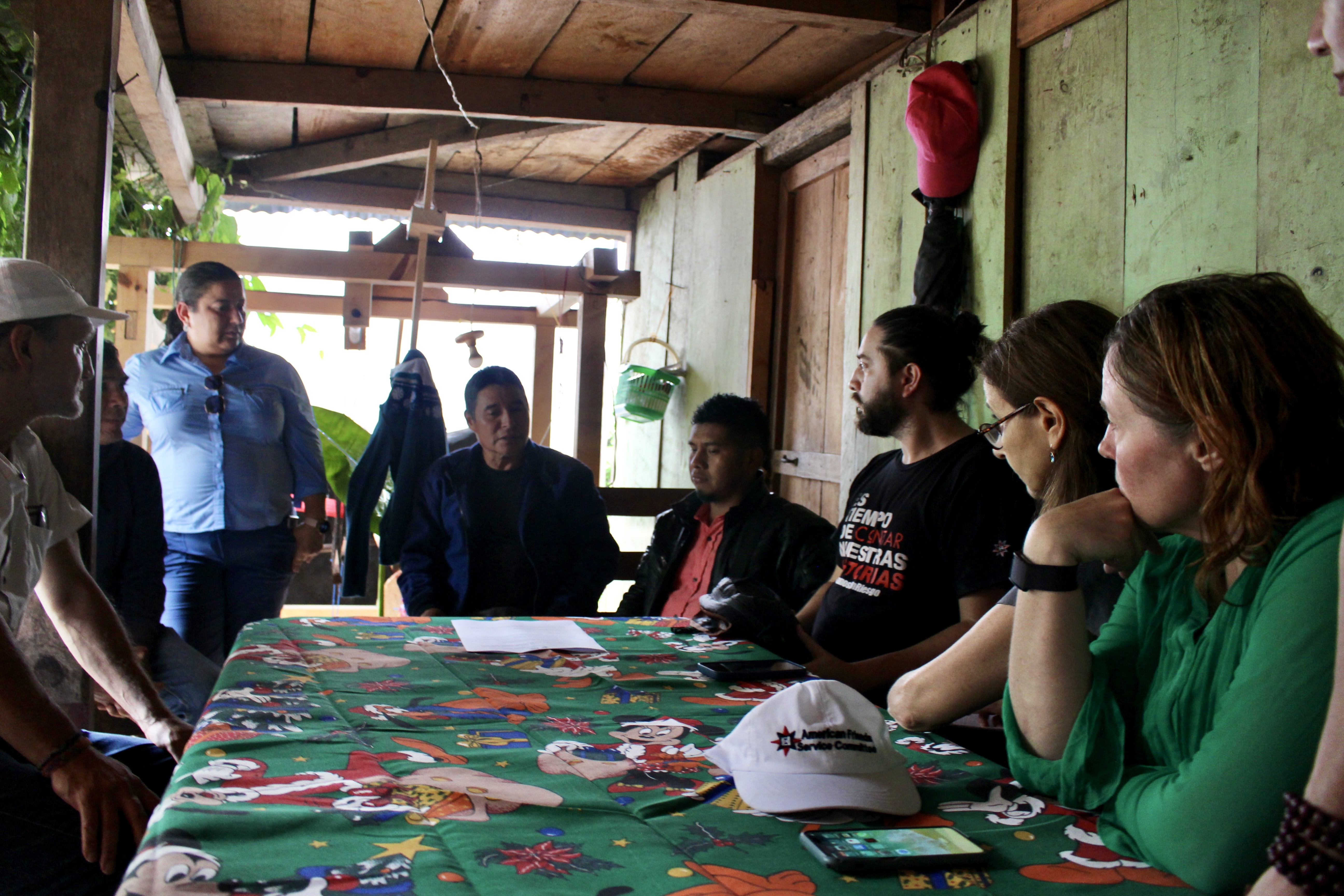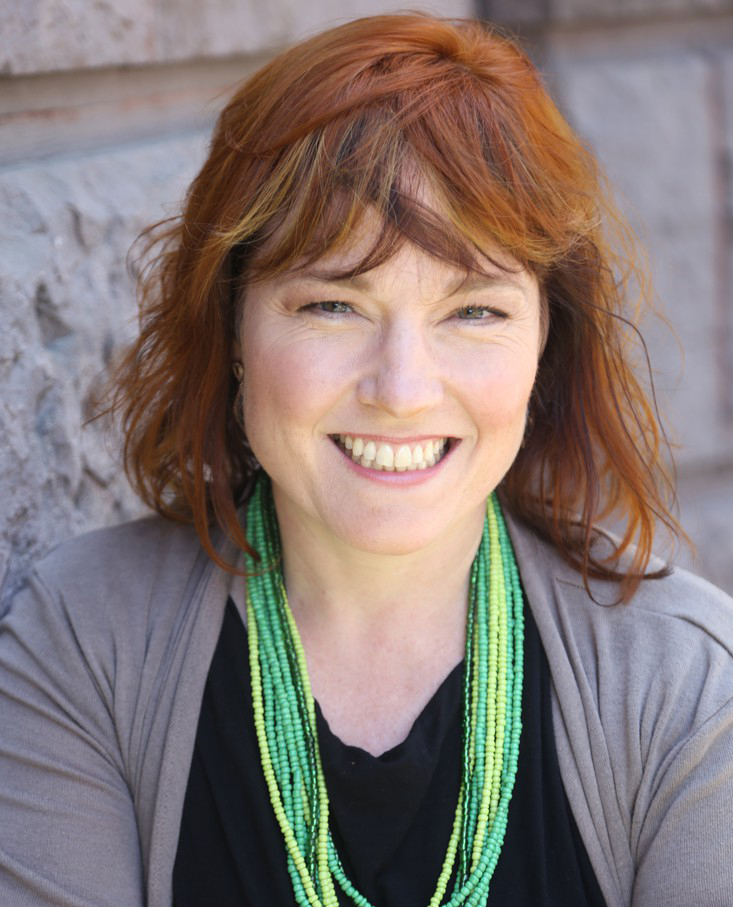
AFSC staff meet with Ixil community members. Photo: Leo Morales
In late May, AFSC General Secretary Joyce Ajlouny and I traveled with our colleagues in Latin America to the highlands of Guatemala. We were going to visit community members of Ixil Mayan ethnicity, in the Ixil territory.
The trip is a five-hour drive from Guatemala City in rolling lush mountains rich with natural resources. Our car dropped us off a few miles from the village, unable to make the drive up the steep rocky path.
We hiked up to Cotzal as a light rain drizzled down along a small creek. That creek was once the mighty Putul River—which was diverted in 2009 by Italian energy company ENEL to build a hydraulic dam. At the village, we met with community leaders who were seeking justice for the harms caused to the Ixil people in the years since.
We gathered outside of a community member’s house, sitting around a small wood table under a thatched roof. We met two of the community’s four Indigenous leaders. In Cotzal, residents select four mayors who rotate leadership for a year at a time and represent the 22 villages in the municipality.
That day, the mayors explained to us how the Putul River had sustained their communities for decades. Saying the river is life, they described their village 30 years ago. The earth was bountiful, and the river gave them what they needed for life—a thriving ecosystem, fish to eat, sand and gravel to build houses.
But when ENEL changed the course of the river to build the dam, it changed everything. The community, predominantly farmers, no longer had fish to eat. Their wells, once filled with drinking water, are now filled with sand from construction. They were promised electricity by the company, but those promises were not kept. They were also given solar panels, but now have no way to replace batteries that no longer work.
Before, the Ixil people grew coffee and maize on the hills. Since the dam was created, the coffee plants and maize have drowned. Pestilent outbreaks are common. Crops are no longer abundant.
For years, the mayors and Indigenous council tried to negotiate with ENEL and the Guatemalan municipal government. They wanted to stop the construction of the dam, which they knew would hurt their livelihoods. They demanded consultations, blocked roads, and set up barriers to compel company representatives to engage in dialogues.
But in all that time, ENEL representatives only engaged sporadically with the community. And the government sided with the corporation—sending military force to quash resistance. In 2011, 1,200 military troops entered these quiet villages. Many community members, remembering what they suffered in the past during 36 years of war, were traumatized by this response. The government issued arrest warrants for nine people who had organized to stop construction of the dam.
After years of community efforts, leaders with the Indigenous council were finally able to convene a meeting with ENEL to begin negotiations. They asked that 20% of the profit from the dam go directly to communities along the river powering the project. They also asked the company to pay for the damage caused to houses by heavy trucks building the dam.
In these meetings, ENEL offered materials like metal sheets for roofs and promised hydroelectric power and other things—none of which it ever delivered. Today, the company pays the municipal government 2 million quetzels ($255,164 USD) a year. But Indigenous communities are not benefiting from the funds and have yet to be compensated for damages caused by the trucks.
Now both ENEL and the government have stopped responding to the community leaders who are most affected by the diverting of the river to the power dam.
Still the group hasn’t stopped pushing for their rights and reparations. In 2011, they had filed for a protective order from the Supreme Court. Over years of protracted legal processes, a judge decreed that ENEL must talk directly to the Indigenous community that leads this municipality. But Guatemala’s central government has yet to acknowledge the protective order, and now the community is again filing for the order to be enforced at the municipal level.
As legal proceedings continue, the harmful impacts of the dam go unchecked. In the past year, the dam disturbed a cave system, flushing out bats and pests that have attacked trees, livestock, and coffee plantations. Illnesses and pestilence continue to spread unabated. And two young men were killed in incidents involving trucks driven by ENEL workers who were drinking.
Although it seems bleak and expensive to continue, the community has kept up their call for justice. At the same time, they worry that if they keep raising their voices, the government will send in the army.
That’s why AFSC is joining Ixil community leaders in their struggle to protect their traditions, their land and natural assets, and livelihoods. We’re working closely with communities to provide support where needed. In the months ahead, AFSC will offer trainings so community members can strengthen their skills to advocate for their rights and freedoms. We will also support research to aid the Ixil people—and other Indigenous communities—in their advocacy to stop dispossession of their lands and violations of their rights. Because AFSC works internationally, we will connect community members with others facing challenges and build broader support for their efforts.
With so much stake, we are committed to doing all that we can to amplify the struggle of the Ixil people until their rights are respected.
